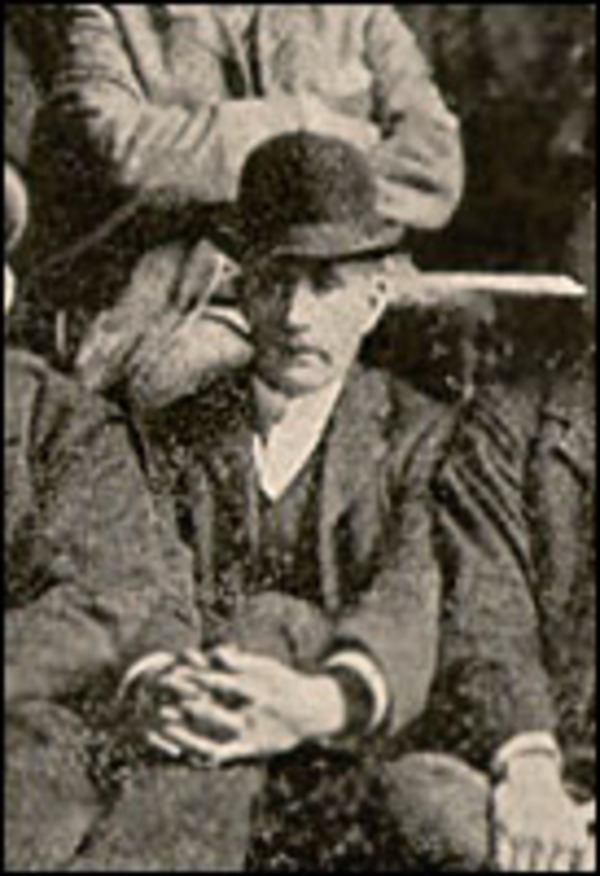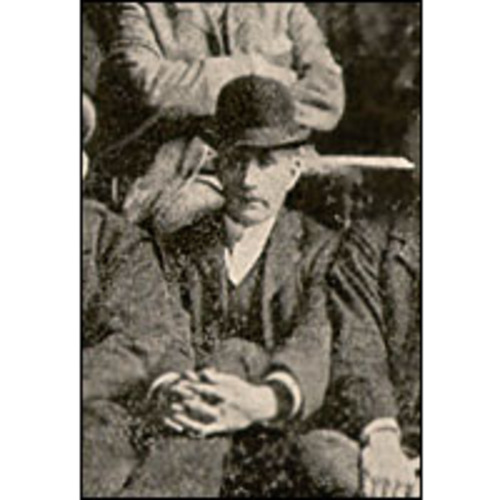
Source: Link
BURKE, JOHN, poet, printer, and impresario; b. 1851 in St John’s, son of Captain John Burke and Sarah Theresa Rutledge; d. there 9 Aug. 1930.
The most famous of Newfoundland’s song makers, John Burke has come to be known as the “Bard of Prescott Street” after the street in downtown St John’s on which he lived almost his entire life. His father, a successful sealing captain, died at sea in 1865 and young John, who had likely been educated at St Bonaventure’s College, began work in the grocery store his mother opened in their home. He, his brother, and his sister, all unmarried, lived together till their deaths. A grocer, auctioneer, printer, actor, singer, poet, theatre manager, and producer of stage shows, he shifted among sources of income for years, but never strayed far from being an entertainer. Not known to take part in sports, Burke was a lifelong fan who was especially fond of boxing; he served at least one year (1903) on the prestigious St John’s Regatta committee.
He was known as a humorous man and a quick rhymer, able to transform the tragic into the comic. From the mid 1880s until the late 1920s, Burke published “slips” – broadside ballads of his own composition. Out of newsworthy events and local tales would come a ditty or commemorative song. Printing them himself, he sold the ballads from his door, and young boys hawked them throughout the city. He used his own press but later he also employed other local printers, especially for large jobs.
His turning to alternative sources of income may have been spurred by the 1892 conflagration that destroyed most of downtown St John’s, including his mother’s grocery. One of his earliest known songs is “The July fire,” which makes witty jokes of the hardships, losses, and insurance claims that followed the disaster. Around this time he began putting on entertainments. From the 1890s to World War I he was a popular impresario in the city, producing public concerts, skits, and parodic operas. Well received by all classes, his stage shows generated the local saying “as funny as a Burke play.” At his peak at least one of his shows was expected every season. Each was a collection of his songs, new and old, often with a longer centrepiece. After his high-cultured cousin Charles Hutton* produced The geisha: a story of a tea house (an 1896, Gilbert-and-Sullivan-like operetta by Owen Hall, Harry Greenbank, and Sidney Jones), Burke wrote and produced The Topsail geisha: a story of the wash house.
He compiled his songs in a dozen or more small books, 50–90 pages, scattered with jokes and advertisements. Some of his earliest songsters were collaborations with James Murphy (another popular poet) and George T. Oliver. Burke’s advertising copy was as entertaining as his songs. Custom-made poems for advertisers sat next to rhymed curses on merchants who bought no space:
May his pipe never smoke, may his teapot be broke,
And to add to the joke may his kettle not boil,
May two dogs and a crackie munge up his tobaccy,
The narrow-faced miser who never could smile.
Burke’s satirical songs, about every conceivable topic, have a cutting, absurdist edge of black humour. His weddings and parties are tumultuous. His dinners are unimaginably huge or inedible. His genteel citizenry is laughably assuming. His self-deprecation is endearing.
When complaints arose about burning garbage, Burke wrote “Don’t you remember the dump, Maggie . . .” (based on “When you and I were young, Maggie” by George Washington Johnson and James Austin Butterfield). After fire damaged a china warehouse and passers-by helped themselves to the goods, Burke’s “Scramble for the teapots at the fire” made fun of the people whose kitchens sported new crockery. His “Trinity cake” is pure surrealist humour – a cake so filled with strange ingredients that it is inedible, even uncuttable:
Ellen Reardigan wanted to taste it,
And she struggled near ready to bust,
When the sealers attacked it with hand-spikes,
To try to remove the top crust.
Then McCarthy went out for a hatchet,
And Flannigan grabbed an old saw
That cake was enough, be the powers,
To paralyze every man’s jaw.
In 1927 the city council threatened to cut off the water to citizens who had not paid their taxes. Burke’s burlesque song “Stoppage of water” had broad double meanings throughout.
His most famous song is “The Kelligrews soiree,” taking off the townspeople who regularly took the short train ride to Conception Bay for elegant get-togethers. Burke’s soirée is anything but elegant. In an effort to extend his popularity, Burke registered it (and two other songs) at the United States Copyright Office. “The Kelligrews soiree” was distributed by an American sheet-music press, but international commercial success eluded him.
Not all Burke songs are humorous. “Lines on the sad death of . . .” starts the title of more than a few of them. Drownings, murder, riot, natural deaths, and shipwrecks were all grist for his mill. Local and foreign sporting events, too, were honoured in his poems. Though St John’s had several newspapers Burke’s slips, printed on the spur of the moment, may have provided the first news that people had of such events.
More of John Burke’s songs have survived than those of any other Newfoundland song maker. No doubt their durability is partly due to his easy access to a press. But it is just as true that his ballads have been reprinted more frequently than others. His songs have remained popular and fresh for a century in both the oral tradition and the commercial repertoire. Ron Hynes’s casting of Burke’s “Old Brown’s daughter,” the original air of which was lost, and Great Big Sea’s “Excursion around the bay” (a rendition of “The Harbour Grace excursion”) are excellent modern versions of his songs. In 1983 a music award was inaugurated in Burke’s name by Esso Petroleum Canada and the Newfoundland and Labrador Arts Council.
John Burke died in poverty almost a decade after his last successful show, Cotton’s patch, a satire on the use of airplanes to spot seal herds. Cinemas, gramophones, and radio had already made his skills obsolete. His slips were no longer being hawked and his attempts to widen his audience had failed. Burke’s better-off cousin Charles Hutton paid for his funeral.
Two recent collections of John Burke’s songs and ballads are available: The ballads of Johnny Burke: a short anthology, ed. Paul Mercer ([St John’s], 1974), and John White’s collection of the songs of Johnny Burke, ed. W. J. Kirwin (St John’s, 1982).
Memorial Univ. of Nfld, Folklore and Language Arch. (St John’s), Tapes, 78-237 (Paul Mercer, interviews with Ken Hall, Mary-Ann Duggan, James Higgins, and Hugh O’Neill, 1973–74). Evening Telegram (St John’s), 11 Aug. 1930. Encyclopedia of Nfld (Smallwood et al.). J. D. Higgins, “The Bard of Prescott Street” (lecture delivered to the Nfld Hist. Soc.; typescript, St John’s, 1970; copy in the Centre for Newfoundland Studies, Memorial Univ. of Nfld). Paul Mercer, “A bio-bibliography of Newfoundland songs in printed sources” (ma thesis, Memorial Univ. of Nfld, 1979), 73–81. M. P. Murphy, “The balladeers of Newfoundland,” Daily News (St John’s), 27 July, 18 Oct., 16 Nov. 1966; Pathways through yesterday, ed. G. S. Moore (St John’s, 1976), 148–65. Newfoundland songs and ballads in print, 1842–1974: a title and first-line index, comp. Paul Mercer (St John’s, 1979). Michael Taft, “The Bard of Prescott Street meets Tin Pan Alley: the vanity press sheet music publications of John Burke,” Newfoundland Studies (St John’s), 6 (1990): 56–73.
Cite This Article
Philip Hiscock, “BURKE, JOHN,” in Dictionary of Canadian Biography, vol. 15, University of Toronto/Université Laval, 2003–, accessed February 21, 2026, https://www.biographi.ca/en/bio/burke_john_15E.html.
The citation above shows the format for footnotes and endnotes according to the Chicago manual of style (16th edition). Information to be used in other citation formats:
| Permalink: | https://www.biographi.ca/en/bio/burke_john_15E.html |
| Author of Article: | Philip Hiscock |
| Title of Article: | BURKE, JOHN |
| Publication Name: | Dictionary of Canadian Biography, vol. 15 |
| Publisher: | University of Toronto/Université Laval |
| Year of publication: | 2005 |
| Year of revision: | 2005 |
| Access Date: | February 21, 2026 |



